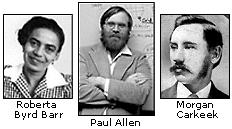 ou gave the jurors hundreds of names and an impossible task: Whittle them down to the 150 most influential men and women in the 150-year history of Seattle and King County. ou gave the jurors hundreds of names and an impossible task: Whittle them down to the 150 most influential men and women in the 150-year history of Seattle and King County.
The panel of 18 historians, civic leaders and journalists couldn't do it. When you look at MetropoLIST 150, you'll see they found ingenious ways to squeeze in more names. Husbands and wives, fathers and sons and daughters are listed together. Brothers are lumped together in other entries.
The nominees for MetropoLIST 150 came from Seattle Times readers, visitors to the Museum of History & Industry (MOHAI) and listeners of KUOW radio. The panelists, selected by MOHAI, also could add names.
The panel spent hours weighing the worth of each nominee. And in the end, the judges weren't completely satisfied, said Leonard Garfield, executive director at MOHAI.
"All had candidates — sometimes many candidates — who did not make the list," he said.
When panel members considered the meaning of "influential," they concluded it was "men and women who shaped the character and course of Seattle and King County history," Garfield said.
Most of the 150 resided in Seattle and made their contributions here (the judges omitted such names as Franklin Roosevelt and Lewis and Clark). Others left to achieve fame in the wider world (Jimi Hendrix), but the jurors mainly looked for those whose achievements were closely tied to our community.
Only one individual — Bill Gates — received the votes of all 18 jurors in the first round of voting.
While some might criticize the list as being stuffed with stowaways, we choose to see it as a sign of the richness of the area's history and an indication the pioneering resourcefulness of its people survives.
And as with any list of this nature, its sponsors — The Seattle Times and MOHAI — hope it will serve as a starting point for more discussions, public and private, of our heritage.
Members of the Panel
Ralph Munro, former secretary of state, chaired the jury that selected the final names.
Members of the panel were: Gerry Alexander, chief justice of the state Supreme Court; Sharon Boswell, historian; Brewster Denny, dean of the University of Washington
Graduate School of Public Affairs; Mindy Cameron, Seattle Times columnist; Ron Chew, executive director of the Wing Luke Asian Museum; Roger Downey, Seattle Weekly critic and cultural historian; Bill Grinstein, Battelle Memorial Institute and chairman of MOHAI
Foundation; Mary Henry, historian and author; Clark Humphrey, cultural critic and writer; Bill Kossen, Seattle Times reporter; Lorraine McConaghy, MOHAI historian; Neil McReynolds, MOHAI Trustee; Penny Peabody, MOHAI president; Quintard Taylor, UW
historian; Susan Trapnell, executive director of the Seattle Arts Commission; Rae Tufts, MOHAI trustee; Karl Thunemann, retired Eastside Journal editorial writer and president of Eastside Heritage Center; James Warren, historian and MOHAI director emeritus; and Jacqueline Williams, historian.
|




 Sunday, October 14, 2001 - 12:00 a.m. Pacific
Sunday, October 14, 2001 - 12:00 a.m. Pacific


